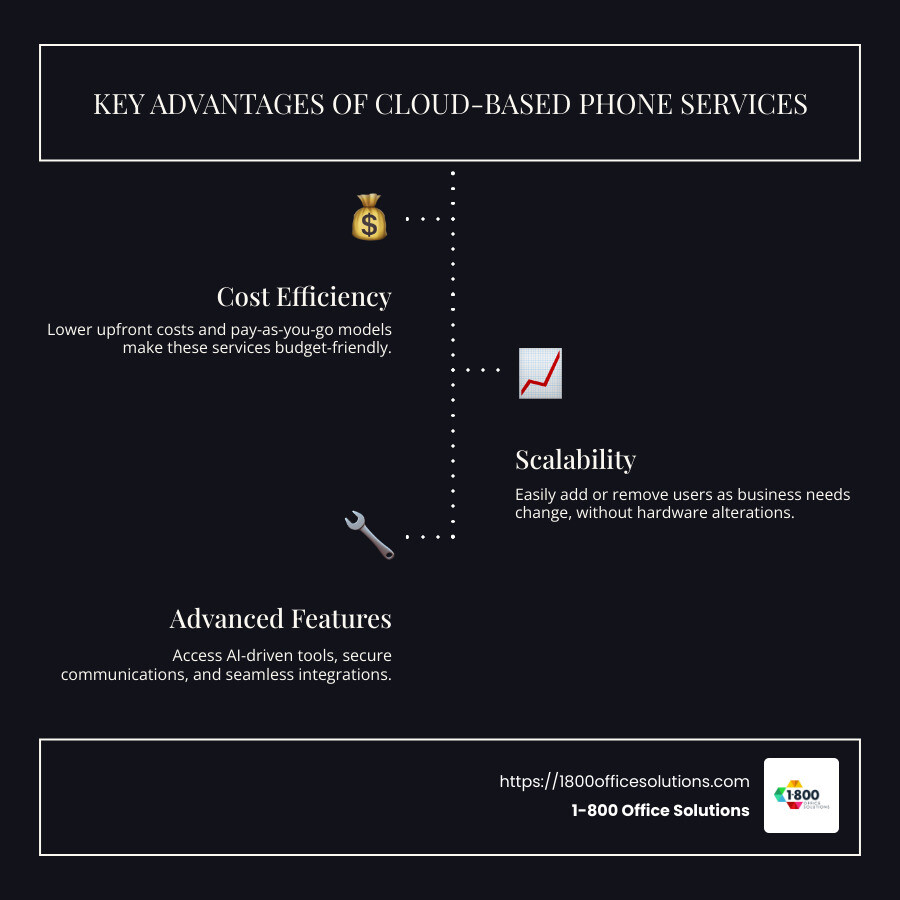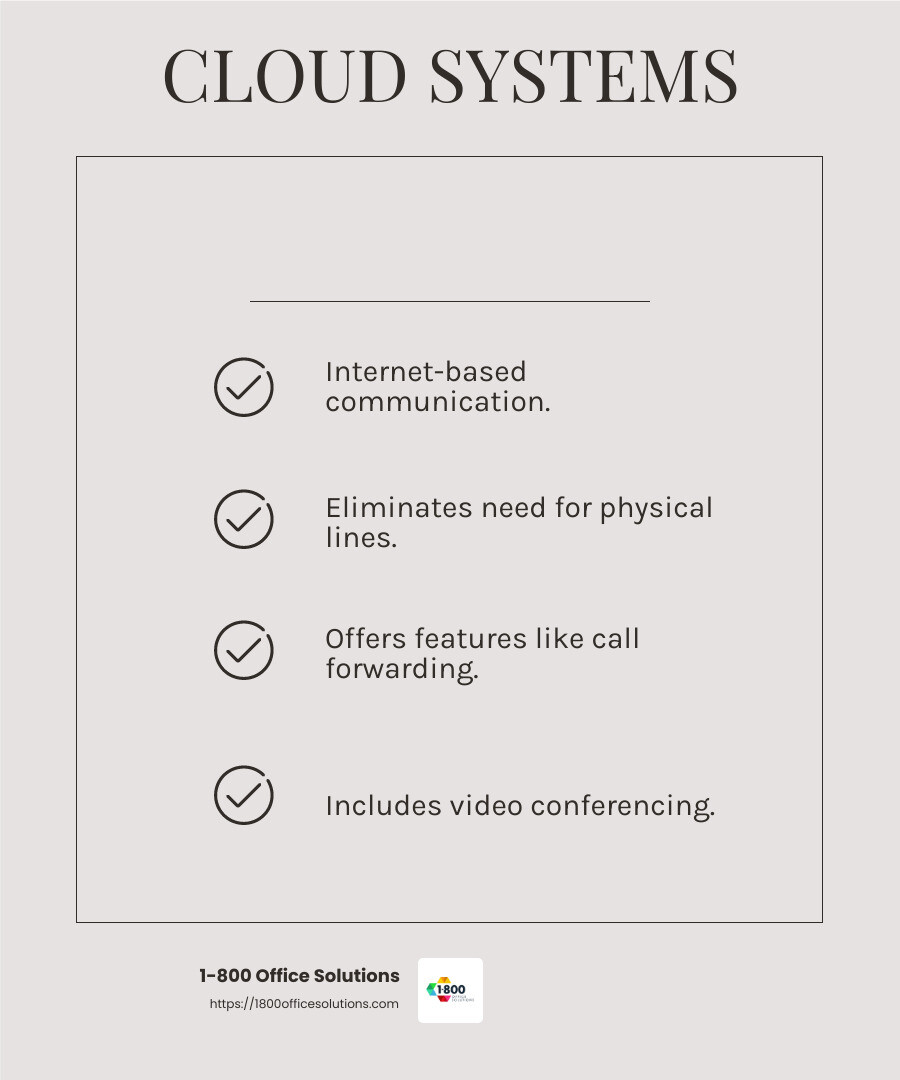Ring in Success: Comparing Cloud-Based Phone Services
When exploring cloud based phone service, you open up a suite of modern communication solutions that leverage the power of the internet. These services—often referred to as cloud telephony—are revolutionizing the way businesses communicate by offering cost savings, improved scalability, and advanced features. By replacing traditional telecom systems with digital solutions, businesses can benefit from unified communications, integrating voice, video, and messaging into a seamless platform. This shift not only ensures greater flexibility but also boosts productivity by enabling remote work capabilities and easier integrations with existing systems.
Navigating the landscape of cloud based phone service need not be overwhelming. Key points to grasp include:
- Scalability: Easily add or remove users without hardware changes.
- Cost Efficiency: Lower upfront costs; pay-as-you-go models.
- Advanced Features: Access to AI-driven capabilities, secure communications, and robust integrations with other business tools.
- Flexibility: Support for remote and diverse teams with interconnected solutions.

Glossary for cloud based phone service:
Understanding Cloud-Based Phone Services
Cloud-based phone services are changing how businesses communicate by using the internet instead of traditional phone lines. This modern approach is often called a cloud phone system. These systems offer businesses a flexible, scalable, and cost-effective way to manage their communication needs.
Cloud Phone Systems
A cloud phone system is an internet-based communication solution that delivers voice calls over the internet. This is different from traditional landline systems, which rely on physical phone lines. By using the cloud, businesses can access a wide range of features, such as call forwarding, video conferencing, and voicemail transcription, all without needing extensive hardware.

Internet-Based Communication
With internet-based communication, businesses can enjoy seamless connectivity from any location. This means employees can make and receive calls, join meetings, and send messages using any internet-connected device, such as smartphones, laptops, or tablets. This flexibility is crucial for supporting remote work and ensuring that teams can stay connected no matter where they are located.
Hosted PBX
A hosted PBX (Private Branch Exchange) is a virtual phone system hosted in the cloud. Unlike traditional PBX systems, which require on-premise equipment, a hosted PBX eliminates the need for expensive hardware. Instead, the service provider manages the system, ensuring it is always up-to-date and secure. This setup allows businesses to focus on their core operations while enjoying advanced communication features.
The benefits of using a hosted PBX include:
- Cost Savings: Reduce the need for physical infrastructure and maintenance.
- Scalability: Easily add or remove lines as your business grows or changes.
- Advanced Features: Access to features like call analytics, auto attendants, and integration with other business tools.
By understanding these key components, businesses can make informed decisions about implementing a cloud-based phone service that meets their unique needs.

This shift toward internet-based communication and hosted PBX systems is not just about cutting costs. It’s about embracing a technology that enables businesses to operate more efficiently and effectively in today’s digital-first world.
Next, we’ll explore the benefits of cloud-based phone services and how they can give your business a competitive edge.
Benefits of Cloud-Based Phone Services
Switching to a cloud-based phone service can be a game-changer for your business, offering numerous advantages that go beyond just making calls. Let’s explore some of the key benefits:
Cost Savings
One of the biggest benefits of cloud-based phone services is the cost savings. Traditional phone systems require expensive hardware, installation, and maintenance. With cloud systems, you eliminate these costs. Instead, you pay a flat monthly fee, which often includes unlimited calling within certain regions, like the USA and Canada. This predictable pricing helps businesses manage their budgets more effectively.
Advanced Features
Cloud phone systems come packed with advanced features that traditional systems simply can’t match. These include:
- Call Forwarding: Redirect calls to different devices or locations with ease.
- Video Conferencing: Host virtual meetings with teams or clients anywhere.
- Auto Attendants: Automatically route calls to the right department or person.
- Screen Sharing: Collaborate in real-time with team members or clients.
These features not only improve communication but also streamline operations and improve customer service.
Scalability
As your business grows, so can your phone system. Scalability is a major advantage of cloud-based services. You can easily add or remove users, set up new locations, or expand your operations without the hassle of installing new phone lines. This flexibility means your communication system can grow with your business, adapting to your changing needs.
Security
Security is a top concern for any business, and cloud phone services are designed with this in mind. Providers use robust security protocols to protect your data and communications. This often includes data encryption, secure data centers, and regular security updates. By choosing a reputable provider, you can ensure that your business communications are protected against cyber threats.
In summary, cloud-based phone services offer significant benefits that can improve your business operations. From reducing costs and offering advanced features to providing scalability and security, these systems are designed to meet the needs of modern businesses.
Next, we’ll look at the key features to look for in a cloud-based phone service, ensuring you choose the right solution for your business.
Key Features to Look for in a Cloud-Based Phone Service
When selecting a cloud-based phone service, consider the features that will best support your business needs. Here are some key features to look for:
Call Forwarding
Call forwarding is crucial for maintaining seamless communication. This feature allows you to redirect incoming calls to different devices or locations. Whether you’re working from home or on the go, you can ensure that important calls reach you or your team without delay.
Video Conferencing
Video conferencing is more important than ever. This feature enables you to host virtual meetings with teams or clients, no matter where they are. With high-quality audio and video, you can conduct discussions, presentations, and training sessions as if everyone were in the same room.
Auto Attendants
An auto attendant acts like a virtual receptionist, guiding callers to the correct department or individual. This feature can significantly improve customer service by reducing wait times and ensuring that calls are efficiently routed. It also allows for a professional touch, with customizable greetings and menu options.
Screen Sharing
Screen sharing is a powerful tool for collaboration. It allows team members to share their screens in real-time during meetings, making it easier to discuss projects, review documents, or conduct training. This feature is particularly beneficial for remote teams, enabling more interactive and engaging communication.
By focusing on these features, you can ensure that your cloud-based phone service not only meets your current needs but also supports your business as it grows. Up next, we’ll explore how to choose the right cloud-based phone service for your business, considering factors like business needs, employee count, and budget.
How to Choose the Right Cloud-Based Phone Service for Your Business
Selecting the ideal cloud-based phone service can significantly impact your business operations. Here’s how to make the best choice for your needs:
Assess Your Business Needs
First, identify what your business requires from a phone system. Are you looking for basic calling features, or do you need advanced capabilities like video conferencing and screen sharing? Understanding your needs will help you narrow down your options.
Consider Employee Count
The number of employees in your organization plays a crucial role in your decision. A small team might need a simple setup, while a larger workforce may require more robust features and scalability. Make sure the service you choose can accommodate your current size and future growth.
Budget Wisely
Budget is always a critical factor. Cloud-based phone services typically operate on a subscription model, with costs varying based on features and user count. Determine how much you’re willing to spend and compare the pricing structures of different providers. Look for a solution that balances cost with the features you need.
Feature Comparison
Not all cloud phone services are created equal. Compare the features offered by different providers. Look for essentials like call forwarding, auto attendants, and mobile app access. Also, consider additional features that can improve productivity, such as integration with other business tools.
By evaluating these factors, you can choose a cloud-based phone service that aligns with your business goals and budget. This thoughtful approach ensures you invest in a solution that supports your team’s communication needs effectively.
Next, we’ll address some frequently asked questions about cloud-based phone services to help you make an informed decision.
Frequently Asked Questions about Cloud-Based Phone Services
What is a cloud-based phone system?
A cloud-based phone system is a modern communication solution that uses the internet to make and receive calls. Unlike traditional landlines, which rely on physical copper wires, cloud systems operate through a network hosted in the cloud. This means you can access your phone system from anywhere, using devices like laptops, smartphones, or tablets.
Cloud phone systems are often referred to as hosted PBX or cloud PBX. They offer features like voicemail, call forwarding, and even video conferencing, all managed through an online dashboard. This flexibility and ease of use make them a popular choice for businesses aiming to streamline their communication processes.
How much does a cloud phone system cost?
The cost of a cloud phone system can vary based on several factors, such as the number of users and the features you need. Most providers offer subscription-based pricing, which means you pay a monthly fee per user. This fee typically ranges from $20 to $40 per month, as noted in Forbes.
Some services might also charge extra for features like SMS texting or international calling. Additionally, signing up for an annual plan often reduces the per-user cost compared to a monthly plan. When budgeting, remember to account for any additional fees and taxes, which can add $5 to $7 per user each month.
What is the difference between VoIP and cloud-based phones?
VoIP stands for Voice Over Internet Protocol, a technology that allows you to make voice calls using a broadband internet connection instead of a regular phone line. Essentially, it’s the technology that powers cloud-based phone systems.
While VoIP refers specifically to the method of transmitting voice data, a cloud-based phone system encompasses the entire service package offered by a provider. This includes not just VoIP calling, but also other features like voicemail, call routing, and integration with other business tools.
In summary, VoIP is the technology that enables internet-based calls, while a cloud-based phone system is a comprehensive service that uses VoIP to deliver a full suite of communication features. This distinction helps businesses understand what they are getting when they choose a cloud phone service.
Next, we’ll explore the benefits of integrating cloud communications into your business strategy.
Conclusion
As we’ve explored, cloud-based phone services offer a modern, flexible, and cost-effective solution for businesses looking to improve their communication infrastructure. At 1-800 Office Solutions, we understand that seamless communication is key to driving business growth and maintaining a competitive edge.
With locations across the United States, including Orlando, Chicago, and Georgia, we are well-positioned to support businesses nationwide in transitioning to cloud communications. Our expertise ensures that you not only adopt the latest technology but also leverage it to its full potential.
By integrating cloud communications into your business strategy, you can enjoy benefits like cost savings, advanced features, and the ability to scale effortlessly. This empowers your team to work more efficiently, connect with customers more effectively, and ultimately, drive business growth.
Ready to transform your communication system? Explore how 1-800 Office Solutions can help you ring in success with our custom business phone systems. Learn more about our services here.











